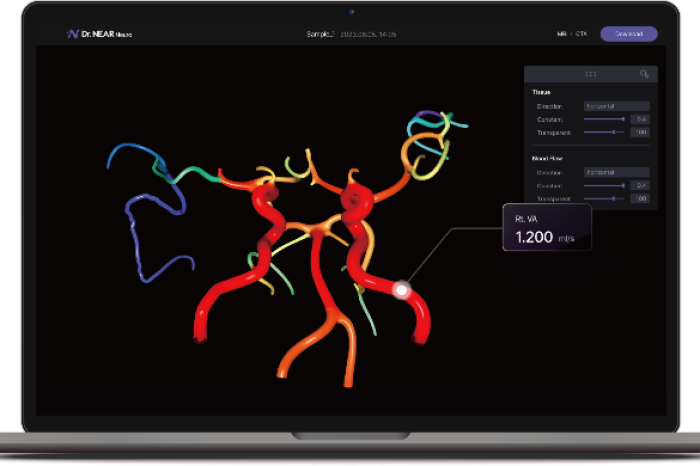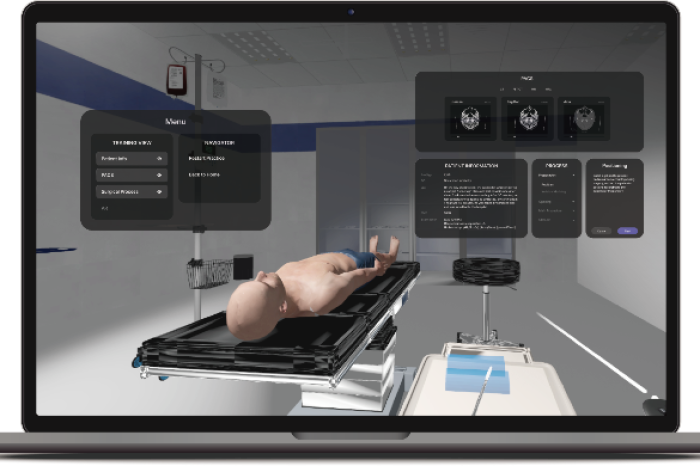Near Brain gives hope to millions of stroke patients worldwide
The S.Korean brain blood flow prediction program developer works with major hospitals in Korea, Singapore and Europe
By Sep 26, 2024 (Gmt+09:00)
When in S. Korea, it’s a ritual: Foreigners make stops at CU, GS25, 7-Eleven


Maybe Happy Ending: A robot love story that rewrote Broadway playbook


NPS yet to schedule external manager selection; PE firms’ fundraising woes deepen


US auto parts tariffs take effect; Korea avoids heavy hit


NCSOFT invests in US game startup emptyvessel



Strokes are the second leading cause of death and the third leading cause of disabilities globally, according to the World Health Organization.
To fight life-threatening cerebrovascular incidents like strokes, Near Brain Inc., a South Korean early stage startup led by a former mechanical engineering researcher, has come forward with programs using cutting-edge digital twin and artificial intelligence technology.
“Our product targets a gray area, wherein medical needs are unmet,” Lee Taerin, founder and chief executive officer of Near Brain, said in a recent interview with The Korea Economic Daily.
Neurologists and neurosurgeons analyze their patients’ brain MRI and MRA images to find causes for different cerebrovascular conditions and determine the correct course of treatment.
“3D-visualized brain blood flow patterns on MRI images are what neurologists and neurosurgeons want, regardless of their specialty,” said Lee. “Monitoring flow was an unmet need.”
Founded in 2022, Near Brain owns the technology that can visualize and reconstruct 3D brain vessel models, using AI technology to calculate blood flow velocity and pressure. With the 3D model, doctors can come up with more accurate diagnoses and the right treatments for a wider array of brain vascular disorders than with conventional MRI and MRA images.
Near Brain has two products, Dr. Near Flow and Dr. Near Training.

Dr. Near Flow is designed to predict blood flow patterns in the brain with visualized 3D cerebrovascular network models based on MRA or MRI imaging data.
Dr. Near Training is a metaverse-based brain surgery simulation platform designed to train neurosurgeons.
UNMET MEDICAL NEEDS
“If doctors know blood flow velocity, they can diagnose patients more accurately and treat them better,” said Lee. “We need to work with doctors to improve the accuracy of our visualized blood flow patterns and determine how to apply them to patients.”
Near Brain has formed partnerships with multiple major medical centers in Korea, including Seoul National University Bundang Hospital and Yonsei University Severance Hospital, to advance its product.
Since the official release of Dr. Near Flow’s final software late last year, the company has been striving to improve the program’s accuracy with patient data collected by a local hospital, said Lee.
The software’s diagnosis accuracy rate currently runs about 91%, according to the CEO.
Severance Hospital also uses Dr. Near Flow to develop a diagnostic tool for hemifacial spasm (HFS), a chronic neurological disorder manifested by involuntary twitching or spasm around one eye or one side of the face.

HEMODYNAMICS
Computer simulation is the base technology of Dr. Near Flow. This is not the company’s original technology but Near Brain incorporates hemodynamics to make virtual bloodstream simulations more accurate with patient-specific information based on different equations.
Hemodynamics is part of computational fluid dynamics, a numerical simulation approach for describing the motion of fluid constituents.
Hemodynamics simulation is not a widely used technology but Near Brain has developed optimized algorithms and parameters to apply proprietary hemodynamics simulations to different patients, Lee explained.
Thanks to such accurate simulation technology, neurosurgeons have asked Near Brain to develop a brain surgery training program to address cerebrovascular disorders in a field where only 5% of neurologists are capable of operating difficult brain surgeries.
In 2023, the startup received 5 billion won ($3.7 million) worth of funding from Korea’s Ministry of Health and Welfare to develop Dr. Near Training over five years. Its prototype was recently developed.
GOING GLOBAL
The company hopes to extend its partnership network to neurosurgery departments in 10 major medical centers in Korea from the current five, Lee said.

However, Korea is not the only country showing interest in Near Brain’s flagship product Dr. Near Flow.
The Korean startup is working with a neurosurgery department professor at the University of Basel in Switzerland to conduct joint research using Dr. Near Flow. It is also in talks with universities, research institutes and companies in Belgium to carry out joint research, said Lee.
The company is also actively seeking to advance into Southeast Asia and the US, according to Near Brain CEO.
“We had partnership offers from European countries and the US after they used our product. This has confirmed demand for our product and I am actively tapping new markets,” said Lee.
Considering different regulations on medical devices and digital treatments by countries, “the gold standard” is gaining US Food and Drug Administration approval, he added.
“Our goal this year is to draw up a plan for our foray into the US after building a network with neurosurgeons in the country who can work with us,” said Lee, adding that he has already met a few doctors there who are interested in Dr. Near Flow.
Earlier this year, Near Brain was invited to Asan Voyager, a program designed to assist Korean startups entering the US by providing acceleration, coaching, community learning and long-term residency support.
The company is also collaborating with multiple hospitals in Southeast Asian countries, including Singapore, Thailand and Indonesia after it was accepted to join Johnson & Johnson’s startup incubation program J Labs.
IN TALKS FOR PRE-SERIES A FUNDING ROUND

To venture into other countries, Near Brain needs more people in sales and marketing as well as who can pursue approval processes, such as getting the FDA nod for its programs.
To hire more talent, Near Brain is in talks with multiple investors for a pre-Series A funding round, Lee said. He didn't confirm the total funding size.
The company has 10 employees, of which six are developers.
In November 2022, Near Brain raised an undisclosed amount of funds from POSTECH Holdings Co. in a seed funding round and 500 million won worth of R&D funds from TIPS, a tech startup incubator in Korea, a year later.
It has earned about 250 million won in the eight months since the official launch of Dr. Near Flow, Lee said.
“I would like to see medical devices engraved with our company logo when I visit hospitals,” said Lee. “I decided to start my own company because I wanted to offer the world useful products made with the technology I have expertise with.”
Lee is a mechanical engineering researcher who spent more than a decade at labs studying and developing numerical methods for fluid dynamics.
Write to Sookyung Seo at skseo@hankyung.com
Jennifer Nicholson-Breen edited this article.
-
 Korean startupsHudson AI dreams of a world without language barriers
Korean startupsHudson AI dreams of a world without language barriersSep 04, 2024 (Gmt+09:00)
6 Min read -
 Korean startupsYC-backed Relate defies conventional wisdom for deeper integration
Korean startupsYC-backed Relate defies conventional wisdom for deeper integrationAug 27, 2024 (Gmt+09:00)
6 Min read -
 Korean startupsEnormous market ahead for Hopae, S.Korean DID pioneer
Korean startupsEnormous market ahead for Hopae, S.Korean DID pioneerAug 22, 2024 (Gmt+09:00)
5 Min read -
 Korean startupsMLOps startup Vessl AI eyes 50% sales from US in 2025
Korean startupsMLOps startup Vessl AI eyes 50% sales from US in 2025Aug 05, 2024 (Gmt+09:00)
5 Min read -
 Korean startupsColosseum poised for next leap with global expansion drive
Korean startupsColosseum poised for next leap with global expansion driveJul 29, 2024 (Gmt+09:00)
6 Min read -

-
 Korean startupsPhyxUp closes in on pre-seed round with US advance
Korean startupsPhyxUp closes in on pre-seed round with US advanceJul 03, 2024 (Gmt+09:00)
4 Min read -
 Korean startupsDentlink, virtual lab for dentists around the world
Korean startupsDentlink, virtual lab for dentists around the worldJun 20, 2024 (Gmt+09:00)
5 Min read -



